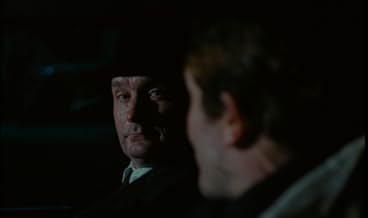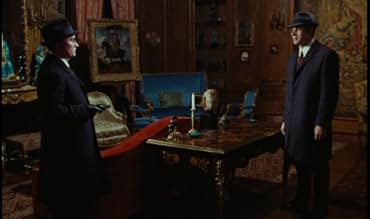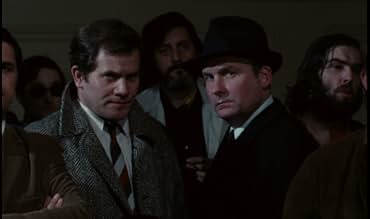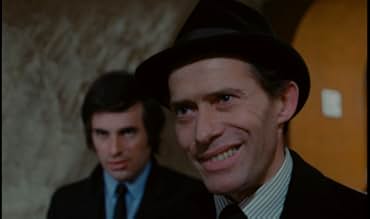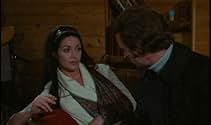Barnero est un flic amer qui travaille dans une ville qu'il considère pourrie.Barnero est un flic amer qui travaille dans une ville qu'il considère pourrie.Barnero est un flic amer qui travaille dans une ville qu'il considère pourrie.
- Réalisation
- Scénario
- Casting principal
Gianni Garko
- Dan Rover
- (as John Garko)
Anne Carrère
- Christine
- (as Anne Carrere)
Théo Sarapo
- Lupo
- (as Theo Sarapo)
Jean-Claude Bercq
- Germain
- (as Jean-Claude Berck)
Stéphan Holmes
- Le jeune garçon
- (as Stephan Holmes)
Avis à la une
Yves Boisset is a very special director, he has made many good films, most importantly, in my opinion, "The Assassination" (1972), with the great Gian Maria Volontè and many other exceptional actors, and "Dog Day"(1984) , with the unparalleled Lee Marvin. In "The Assassination", as a corrupt lawyer, we find the extraordinary Michel Bouquet, who here, in "The Cop", he is the cop, a policeman like you have not seen in other movies, a cop with an original philosophy, kindred somehow, with Clint Eastwood's Dirty Harry. But different! Michel Bouquet is an actor who does not need too many specific means or too many replicas to create memorable characters, Michel Bouquet is an absolute force, only by the way he looks, moves and breathes. Likewise, but in another register, it is Michel Constantin, who also plays a smaller role, but, as usual, natural, impeccable. Françoise Fabian is beautiful and natural. Probably the best part of Gianni Garko. So, Bernard Fresson. Adolfo Celi, a small role too but, as usual, very effective. Rufus, Théo Sarapo, Henri Garcin, Pierre Massimi, the same, very good. Need absolutely to be seen!
Yves Boisset is not one of the famous French directors, which amplifies for me the (pleasant) surprise of watching his 1970 film 'Un condé' ('The Cop'). The director, who had been Jean-Pierre Melville's assistant, among others, demonstrates here that he not only learned many of the secrets of the trade from his master, but also that he had the courage to combine the genre of film noir (a tradition in French movies) with political cinema. The result makes of 'Un condé' both violent entertainment in the genre of the movies in which the cops are only a little less evil than the gangsters they face, and a political film in which a crisp message and characters immersed in moral corruption. In perfect synchronicity with what was happening at the same time in American cinema, 'Un condé' brings to the screen a vigilante hero with whom, as spectators, we identify for a while, until the moment the violence accumulates and we begin to question whether justice achieved through such illegal means remains justice, even in situations where there seems to be no alternative to the use of violence.
I liked the way this story is told. It starts with a settlement of accounts in the underworld between a gang of mobsters who do not hesitate to use any kind of violence to achieve their goals and the owner of a place who refuses to give up and pays with his life. When his sister and his best friend decide to take revenge, we, as spectators, cannot help but empathize with their feelings. A pair of policemen who seem incorruptible and who, because they are honest, are marginalized in a system that prefers to reach a 'modus vivendi' with criminals, comes into action. When one of them is killed by the same gang of mobsters, revenge seems justified, and again, as spectators, we are involved. The problem is that the world described in the film does not know clean methods to achieve its goals. Revenge means homicide, and police use Gestapo-like methods of interrogation. Made in 1970, 'Un condé' contains a strong post-1968 message of protest against police violence, which Yves Boisset will continue in his future films.
Made during the heyday of the 'film noir' genre in French cinema, a genre that had absorbed some of the talents of the New Wave, 'Un condé' is not inferior to many of the best-known achievements of the genre. The clear and intelligent script, the consistent visual conception and the fact that the characters are not morally judged for what they do contribute to this. They are committing atrocities for noble causes: friendship, fighting crime, opposing police corruption. If there is a culprit, this is the system that does not leave them too many alternatives. Michel Bouquet creates one of the best roles of his career and Michel Constantin adds another role to the ones that made him a favorite actor in gangster movies over several decades. I recommend the film, which in my opinion falls into the category of cinematic jewels that need to be rediscovered.
I liked the way this story is told. It starts with a settlement of accounts in the underworld between a gang of mobsters who do not hesitate to use any kind of violence to achieve their goals and the owner of a place who refuses to give up and pays with his life. When his sister and his best friend decide to take revenge, we, as spectators, cannot help but empathize with their feelings. A pair of policemen who seem incorruptible and who, because they are honest, are marginalized in a system that prefers to reach a 'modus vivendi' with criminals, comes into action. When one of them is killed by the same gang of mobsters, revenge seems justified, and again, as spectators, we are involved. The problem is that the world described in the film does not know clean methods to achieve its goals. Revenge means homicide, and police use Gestapo-like methods of interrogation. Made in 1970, 'Un condé' contains a strong post-1968 message of protest against police violence, which Yves Boisset will continue in his future films.
Made during the heyday of the 'film noir' genre in French cinema, a genre that had absorbed some of the talents of the New Wave, 'Un condé' is not inferior to many of the best-known achievements of the genre. The clear and intelligent script, the consistent visual conception and the fact that the characters are not morally judged for what they do contribute to this. They are committing atrocities for noble causes: friendship, fighting crime, opposing police corruption. If there is a culprit, this is the system that does not leave them too many alternatives. Michel Bouquet creates one of the best roles of his career and Michel Constantin adds another role to the ones that made him a favorite actor in gangster movies over several decades. I recommend the film, which in my opinion falls into the category of cinematic jewels that need to be rediscovered.
The basic motif to see it remains the admirable job of Michel Bouquet. A film about friendship, duty and corruption , simple, precise and using cold tones.
A cop is killed.
His colegue looks for the murderer, using all tools for find him.
Nothing new but seductive for the cinematography and for the wise way to use American model, giving to it profound nuances.
A film about guilty, to.
Interesting for the exploration of characters.
A cop is killed.
His colegue looks for the murderer, using all tools for find him.
Nothing new but seductive for the cinematography and for the wise way to use American model, giving to it profound nuances.
A film about guilty, to.
Interesting for the exploration of characters.
This was a rather more than faithful adaptation of the Pierre Lesou's novel. A fierce story about two vengeance schemes involved one in the other. Two friends decide to avenge the death of one of their own and then kill a cop whose his friend decides to avenge him...Follow me? You have here one of best Michel Constantin's performances ever. Don't miss him facing Michel Bouquet. His lines are unforgettable. But something is missing, if you compare to the book. HOW DAN ROVEL'S CHARACTER GETS OUT OF JAIL?
No one seems to have noticed this detail.
Typical from Yves Boisset about the power of police, and the way cops sometimes can trespass the law. A true powerful film.
No one seems to have noticed this detail.
Typical from Yves Boisset about the power of police, and the way cops sometimes can trespass the law. A true powerful film.
Harry Callaghan and Popeye Doyle have become iconic characters since their first appearances in the early seventies and the Rogue Cop genre has remained extremely popular.
To non-European audiences Inspector Favanin is hardly likely to be a household name. His character appeared in 1970 in this film of Yves Boisset and it is well-nigh impossible fifty years on to appreciate just what an impact the film made and the obstacles its director faced to get it released without cuts. Due to its graphic violence and its depiction of the police, Boisset was obliged to go before a censorship committee one of whose members was Jean-Pierre Melville(!) and eventally its release was approved. Suffice to say its notoriety guaranteed excellent box office.
The masterstroke here is the casting, against type, of Michel Bouquet. When his friend and colleague played by Bernard Fresson is killed in the line of duty Favenin becomes an avenging angel, using any means at his disposal to track down those responsible, thereby becoming not only judge and jury but also executioner.
As one would expect from Boisset this is a study in corruption and furthermore, by the standards of its time its content is relentlessy grim, desolate and bloody. There are no romantic, folk hero types here with their particular moral codes in the style of Melville but instead beasts in the jungle. Does Favenin regret his actions? The final shot of him sitting alone is cleverly ambiguous.
Bouquet is riveting in the role and he is ably supported by Adolfo Celi, Michel Constantine, Gianni Gekko, Henri Garcin and Francoise Fabian.
Although this film undeniably broke new ground and forever transformed the genre in France, I personally harbour no desire to view it again.
Ironically, it was knocked off its top slot by 'Le Cercle Rouge' of none other than Jean-Pierre Melville!
To non-European audiences Inspector Favanin is hardly likely to be a household name. His character appeared in 1970 in this film of Yves Boisset and it is well-nigh impossible fifty years on to appreciate just what an impact the film made and the obstacles its director faced to get it released without cuts. Due to its graphic violence and its depiction of the police, Boisset was obliged to go before a censorship committee one of whose members was Jean-Pierre Melville(!) and eventally its release was approved. Suffice to say its notoriety guaranteed excellent box office.
The masterstroke here is the casting, against type, of Michel Bouquet. When his friend and colleague played by Bernard Fresson is killed in the line of duty Favenin becomes an avenging angel, using any means at his disposal to track down those responsible, thereby becoming not only judge and jury but also executioner.
As one would expect from Boisset this is a study in corruption and furthermore, by the standards of its time its content is relentlessy grim, desolate and bloody. There are no romantic, folk hero types here with their particular moral codes in the style of Melville but instead beasts in the jungle. Does Favenin regret his actions? The final shot of him sitting alone is cleverly ambiguous.
Bouquet is riveting in the role and he is ably supported by Adolfo Celi, Michel Constantine, Gianni Gekko, Henri Garcin and Francoise Fabian.
Although this film undeniably broke new ground and forever transformed the genre in France, I personally harbour no desire to view it again.
Ironically, it was knocked off its top slot by 'Le Cercle Rouge' of none other than Jean-Pierre Melville!
Le saviez-vous
- AnecdotesAlthough his film is close to Pierre Lesou's novel, director Yves Boisset confessed that, during the scene between Michel Constantin and Michel Bouquet, he was influenced by Jean-Pierre Melville's films' atmosphere and dialogue.
- Versions alternativesDue to pressure from then French Minister of the Interior Raymond Marcellin, the film had a tough time getting approved for release and director Yves Boisset was finally forced to cut a few lines of dialogue and reshoot the interrogation scene. The film was shown uncut and with the original scene internationally. In France, the original scene can be seen as a bonus feature on home video.
- ConnexionsReferenced in Parole de cinéaste: Yves Boisset: le cinéaste le plus censuré de France (2013)
Meilleurs choix
Connectez-vous pour évaluer et suivre la liste de favoris afin de recevoir des recommandations personnalisées
Détails
- Date de sortie
- Pays d’origine
- Langues
- Aussi connu sous le nom de
- Le Condé
- Lieux de tournage
- Fourges, Vexin-sur-Epte, Eure, France(ending scene at the water mill)
- Sociétés de production
- Voir plus de crédits d'entreprise sur IMDbPro
- Durée1 heure 35 minutes
- Mixage
- Rapport de forme
- 1.66 : 1
Contribuer à cette page
Suggérer une modification ou ajouter du contenu manquant


